Monday, 12 May
RIPE 68 kicked off on Monday morning in the historical city of Warsaw. Despite the grey clouds and somewhat chilly May weather, we welcomed what is shaping up to be a record number of attendees ready for a week chock full of interesting presentations – and a special celebration of 25 years of RIPE.
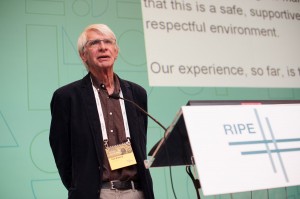 RIPE Chair Rob Blokzijl welcomed attendees to the RIPE Meeting – the 68th that he’s presided over and his last as RIPE Chair.
RIPE Chair Rob Blokzijl welcomed attendees to the RIPE Meeting – the 68th that he’s presided over and his last as RIPE Chair.
During the Opening Plenary, Jakub Kozioł from the RIPE 68 host organisation, PLNOG, drew parallels between the beginnings of RIPE and the beginnings of PLNOG, in that both organisations started as a small, core group of like-minded individuals.
A presentation on the “Turris Router” took centre stage during the opening plenary, as it helps protect users’ home networks as part of “Project Turris”, a CZ.NIC not-for-profit research project.
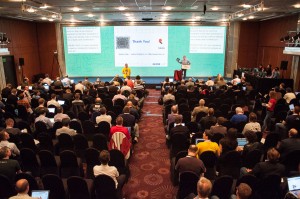 Geoff Huston, APNIC, presented on the expansion of BGP tables over time, noting that growth is remarkably stable and linear considering the development of the Internet. Geoff concluded that the network is very stable. But, he asked, can – and should – we do better? He concluded that indeed, we probably should.
Geoff Huston, APNIC, presented on the expansion of BGP tables over time, noting that growth is remarkably stable and linear considering the development of the Internet. Geoff concluded that the network is very stable. But, he asked, can – and should – we do better? He concluded that indeed, we probably should.
Chris Grundemann noted that network operators are not participating in IETF as much as before, and that ISOC is seeking feedback as to whether or not this is an issue.
Rumy Kanis, the RIPE NCC’s Training Services Manager, invited input on increasing workshops and trainings before, during or after RIPE Meetings.
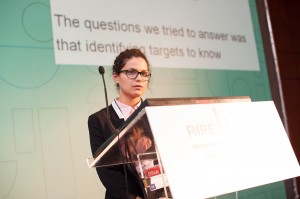 Samaneh Tajalizadehkhoob, selected by the RIPE Academic Cooperation Initiative (RACI) to present at RIPE 68, delivered a lightning talk about online banking fraud and how targets are selected by cyber criminals.
Samaneh Tajalizadehkhoob, selected by the RIPE Academic Cooperation Initiative (RACI) to present at RIPE 68, delivered a lightning talk about online banking fraud and how targets are selected by cyber criminals.
Tuesday, 13 May
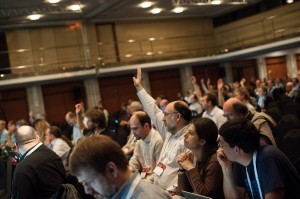 We welcomed more attendees to RIPE 68 on Tuesday, bringing the total number of participants to 538 so far. Warsaw’s blue skies provided a serene backdrop to a day filled with exciting topics including cybersecurity, IPv6 and Internet governance. Jaari Arkko, IETF, urged participants to “understand the kind of threats the Internet is facing [in order] to do credible engineering” and that “technology should evolve to support privacy”.
We welcomed more attendees to RIPE 68 on Tuesday, bringing the total number of participants to 538 so far. Warsaw’s blue skies provided a serene backdrop to a day filled with exciting topics including cybersecurity, IPv6 and Internet governance. Jaari Arkko, IETF, urged participants to “understand the kind of threats the Internet is facing [in order] to do credible engineering” and that “technology should evolve to support privacy”.
“My name is Job Snijders and I do stuff for the Internet” – Job Snijders talked engagingly about “selective blackholing” and the benefits that this provides when compared to “classic blackholing”, essentially limiting the scope of the damage.
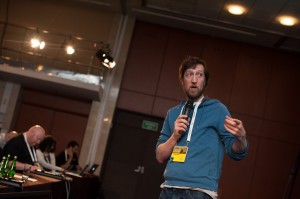 IPv6 was the predominant topic during the second plenary session of the day, including the ease (or lack thereof) of scanning IPv6 subnets and whether NAT provides additional security for the network. Another key topic was how to determine success with regards to IPv6 deployment. Further discussion is expected throughout the week – especially during the IPv6 Working Group sessions that will be held on Thursday morning.
IPv6 was the predominant topic during the second plenary session of the day, including the ease (or lack thereof) of scanning IPv6 subnets and whether NAT provides additional security for the network. Another key topic was how to determine success with regards to IPv6 deployment. Further discussion is expected throughout the week – especially during the IPv6 Working Group sessions that will be held on Thursday morning.
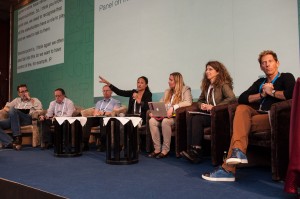 Looking to the future of Internet governance arrangements, including the hot topic of the possible change to IANA functions, the Panel on Internet Governance Landscape 2014 discussed the RIPE community processes and whether RIPE is ready to receive input from the full range of Internet stakeholders, how (and whether) the technical community should contribute to political discussions, and whether public policy issues can be solved through the multi-stakeholder decision-making processes. Rob Blokzijl later joked that “you can make 4,736 words out of ‘multi-stakeholderism'”.
Looking to the future of Internet governance arrangements, including the hot topic of the possible change to IANA functions, the Panel on Internet Governance Landscape 2014 discussed the RIPE community processes and whether RIPE is ready to receive input from the full range of Internet stakeholders, how (and whether) the technical community should contribute to political discussions, and whether public policy issues can be solved through the multi-stakeholder decision-making processes. Rob Blokzijl later joked that “you can make 4,736 words out of ‘multi-stakeholderism'”.
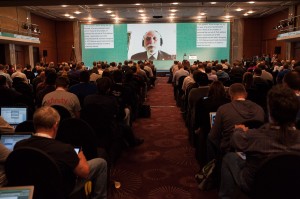 Vint Cerf, Google’s IPv6 Evangelist, made a video appearance during the 25 Years of RIPE celebratory plenary session that closed the day’s events. Vint stated that RIPE is, indeed, ripe, after 25 years and will continue to mature. He urged attendees to lobby their ISPs for dates regarding IPv6 deployment and pushed for a smooth transition period from IPv4 to IPv6, acknowledging that this isn’t easy.
Vint Cerf, Google’s IPv6 Evangelist, made a video appearance during the 25 Years of RIPE celebratory plenary session that closed the day’s events. Vint stated that RIPE is, indeed, ripe, after 25 years and will continue to mature. He urged attendees to lobby their ISPs for dates regarding IPv6 deployment and pushed for a smooth transition period from IPv4 to IPv6, acknowledging that this isn’t easy.
Wednesday, 14 May
Wednesday’s sessions opened with a healthy dose of debate in the various sessions around topics ranging from policy to DNS.
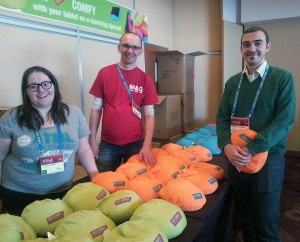 The Address Policy Working Group addressed personal identification, discussing what level of due diligence should be required when verifying resource holders. The working group also discussed an issue with 16-bit ASNs being returned that are still referenced in the RIPE Database, which has prevented the RIPE NCC from reassigning those resources. This inspired actions from both Wilfried Woeber, Univie/ACOnet/VIX, who agreed to take this to the Database Working Group to try and find a solution in order to perform a clean-up, and to the Address Policy Working Group, which decided to draft a statement to the IETF, urging them to standardise the use of 32-bit BGP communities.
The Address Policy Working Group addressed personal identification, discussing what level of due diligence should be required when verifying resource holders. The working group also discussed an issue with 16-bit ASNs being returned that are still referenced in the RIPE Database, which has prevented the RIPE NCC from reassigning those resources. This inspired actions from both Wilfried Woeber, Univie/ACOnet/VIX, who agreed to take this to the Database Working Group to try and find a solution in order to perform a clean-up, and to the Address Policy Working Group, which decided to draft a statement to the IETF, urging them to standardise the use of 32-bit BGP communities.
Marco Schmidt was welcomed into his role as the Policy Development Officer for the RIPE NCC. Marco and Jan Zorz, Internet Society, reported back in the second session of the Address Policy Working Group on their investigation into ambiguous language in policy documents. The group discussed how to clear up any ambiguity while preserving the original intention of the policy (for example, “should” intending to mean “must”). The working group decided to deal with the issue with a policy proposal.
Sandra Brown, IPv4 Market Group, announced her intention to draft a new proposal that would allow for inter-RIR transfers of IPv4 address space. When transferring resources to another RIR, the RIPE NCC would work with the destination RIR to allow the transfer and will work with the originating RIR in reverse cases. The existing legacy proposal would apply to legacy space that is transferred. This proposal hasn’t been entered into the PDP yet.
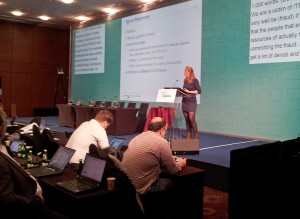 The DNS Working Group saw a number of presentations about measuring DNSSEC deployments using various measurement methodologies and systems. The monitoring of DNS infrastructure was also a hot topic, with an analysis of Turkey’s recent actions towards Google’s DNS services, a description of changes to the RIPE NCC DNSMON service, and a panel discussion about how statistics collection and DNS monitoring could potentially be standardised.
The DNS Working Group saw a number of presentations about measuring DNSSEC deployments using various measurement methodologies and systems. The monitoring of DNS infrastructure was also a hot topic, with an analysis of Turkey’s recent actions towards Google’s DNS services, a description of changes to the RIPE NCC DNSMON service, and a panel discussion about how statistics collection and DNS monitoring could potentially be standardised.
There were mixed responses to improvements suggested for making the RIPE Database more intuitive, especially for new users, and the Database Working Group Chair suggested holding an open meeting in Amsterdam before the next RIPE Meeting for anyone interested in the future development of the RIPE Database.
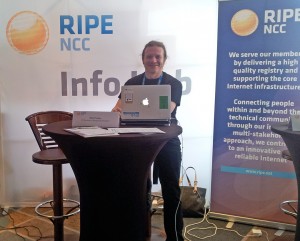 During the RIPE NCC Services Working Group session, RIPE NCC Director of External Relations Paul Rendek gave a (virtual) introduction to the RIPE NCC’s new staff members in Dubai and Moscow. Piotr Strzyżewski, Silesian University of Technology, Computer Centre, gave a presentation that asked the question, “Do we need more auditing of RIPE NCC projects?” The question led to a good discussion about the value of the RIPE Atlas project and how processes might be improved to ensure the fewest number of “lost” probes possible.
During the RIPE NCC Services Working Group session, RIPE NCC Director of External Relations Paul Rendek gave a (virtual) introduction to the RIPE NCC’s new staff members in Dubai and Moscow. Piotr Strzyżewski, Silesian University of Technology, Computer Centre, gave a presentation that asked the question, “Do we need more auditing of RIPE NCC projects?” The question led to a good discussion about the value of the RIPE Atlas project and how processes might be improved to ensure the fewest number of “lost” probes possible.
Thursday, 15 May
Thursday saw 564 attendees checked in to RIPE 68. Some RIPE Working Groups bid farewell to familiar faces and new chairs were welcomed.
Following the closure of the EIX Working Group, the Connect Birds of a Feather (BoF) session took place. David Kessens announced that he is stepping down as IPv6 Working Group Chair. As Shane Kerr and Marco Hogewoning plan to rotate out from their IPv6 Working Group Chair roles, a number of people stepped up during the IPv6 Working Group session to take the helm. The process of selecting new chairs will be continued on the IPv6 Working Group mailing list.
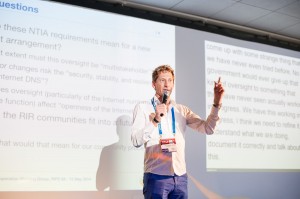 Steered by its new collective of chairs, the Cooperation Working Group, for the first time, was conducted over two sessions. Along with presentations covering a variety of issues, there was a community discussion of the NTIA’s intention to transition out of IANA oversight. The chairs closed the sessions by expressing their hopes for the working group moving forward, acting, particularly, as a RIPE “brains trust” for engaging with public policy issues relating to the Internet.
Steered by its new collective of chairs, the Cooperation Working Group, for the first time, was conducted over two sessions. Along with presentations covering a variety of issues, there was a community discussion of the NTIA’s intention to transition out of IANA oversight. The chairs closed the sessions by expressing their hopes for the working group moving forward, acting, particularly, as a RIPE “brains trust” for engaging with public policy issues relating to the Internet.
The Measurements, Analysis and Tools (MAT) Working Group session included several research talks about how RIPE Atlas data can be used, as well as a talk about Internet-wide active scanning, delivered by Zakir Durumeric. He discussed the ethics of active Internet scanning using ZMap, an open source IPv4 address scanning tool available to larger research institutions. His research discovered that 1% of private keys being randomly generated on the Internet have duplicates, leaving those hosts, which are often not regularly updated, vulnerable to attacks. An interesting discussion ensued about the ethics of this kind of scanning and how to best share the collected data.
Marco Hogewoning’s presentation on interactions between the RIPE NCC and Law Enforcement Agencies provoked lively discussion within the Anti-Abuse Working Group about the level of transparency regarding details of content, attendees, and organisations at LEA meetings. There were requests from the floor for “attendee lists” to be published for these meetings and Marco agreed to investigate the possibility of producing this. However, there was some agreement amongst participants that an appropriate balance must be found, a balance between providing the privacy that these organisations and their attendees require, and providing enough information to the community.
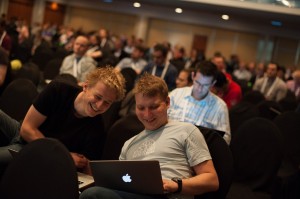 Documentation was a recurrent topic throughout the day. In the Routing Working Group session, Benno Overeinder explained that RDL is all about not configuring routers but documenting and programming the AS. Job Snijders presented on documenting automated prefix filtering and, in the Anti-Abuse Working Group session, there were discussions regarding the reporting of abuse and what guidelines might be required. Denis Walker stated that if there is a demand for guidelines regarding what sort of reports should be sent regarding abuse, and how people should respond to them, then the text should come from the community. Ruediger Volk agreed, commenting that it is “meaningless” to do validation beyond the mechanic without guidelines.
Documentation was a recurrent topic throughout the day. In the Routing Working Group session, Benno Overeinder explained that RDL is all about not configuring routers but documenting and programming the AS. Job Snijders presented on documenting automated prefix filtering and, in the Anti-Abuse Working Group session, there were discussions regarding the reporting of abuse and what guidelines might be required. Denis Walker stated that if there is a demand for guidelines regarding what sort of reports should be sent regarding abuse, and how people should respond to them, then the text should come from the community. Ruediger Volk agreed, commenting that it is “meaningless” to do validation beyond the mechanic without guidelines.
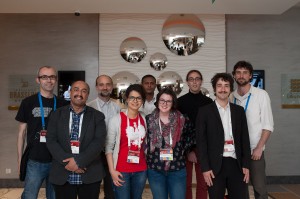 The day closed with three candidates from the RIPE Academic Cooperation Initiative (RACI), who presented their research to members of the community at the RACI BoF session.
The day closed with three candidates from the RIPE Academic Cooperation Initiative (RACI), who presented their research to members of the community at the RACI BoF session.
Friday, 16 May
The final day of RIPE 68 saw updates from the Regional Internet Registries, the Number Resource Organization, and the Internet Assigned Numbers Authority (IANA). There was a very special closing plenary where Rob Blokzijl stepped down as RIPE Chair and Hans Petter Holen took the reins.
Elections were held for the RIPE Programme Committee (PC). Google’s Meredith Whittaker and Jan Zorz, Internet Society (ISOC), were elected to the PC and the ISOC’s Andrei Robachesky stepped down as the RIPE PC ENOG representative. He announced that NetArt Group’s Sergei Myasoedov would take over this role as the ENOG representative.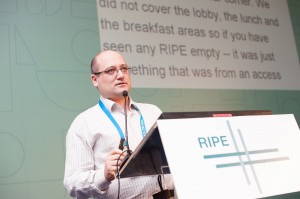
Emile Aben, RIPE NCC, presented on OpenIP, an idea about how to crowdsource geolocation of IP addresses. He said that no comprehensive service like this currently exists and asked for contributions from the community.
The RIPE NCC’s Razvan Oprea delivered the RIPE 68 Technical Report, commenting on the network at the RIPE Meeting. He stated that there was an increase in outgoing IPv6 traffic, which came from Jim Reid, RTFM LLP, uploading presentations over IPv6. Razvan requested that feedback about the network is sent to opsmtg [at] ripe [dot] net. IPv6 Working Group Chair Marco Hogewoning thanked Cisco’s Andrew Yourtchenko, and the Technical Team for their help in running the independent, IPv6-only, experimental network.
Randy Bush, Internet Initiative Japan, gave a lightning talk on his work to build a more assured hardware security model (HSM) with a more assured tool-chain. The project was open and transparent, and Randy invited the community to review and support the source code. He asked those interested to visit https://cryptech.is/ to find out more. Randy gave a second talk on using RPKI for OpenFlow switches, which is being worked on by network operators in New Zealand.
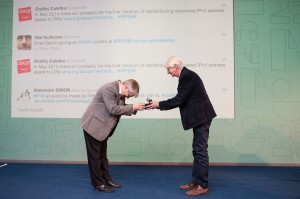 Rob Blokzijl highlighted that a successful RIPE Meeting is only possible with the support of a local host and thanked the meeting’s sponsors. Rob reported that RIPE 68 was the largest RIPE Meeting to date, with 569 attendees checked in, 160 of which were newcomers. He noted that the largest group of participants were from the United States, “a well-known part of Europe”.
Rob Blokzijl highlighted that a successful RIPE Meeting is only possible with the support of a local host and thanked the meeting’s sponsors. Rob reported that RIPE 68 was the largest RIPE Meeting to date, with 569 attendees checked in, 160 of which were newcomers. He noted that the largest group of participants were from the United States, “a well-known part of Europe”.
As his final act as RIPE Chair, Rob Blokzijl handed over a black box representing “the Internet” to Hans Petter Holen, the incoming RIPE Chair. Hans Petter stated where he sees the RIPE community heading in the future. The 68th RIPE Meeting ended with members of the RIPE community expressing their appreciation to Rob for his 25 years of guidance, via video tributes and a standing ovation from the room.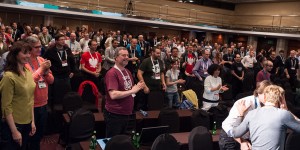
RIPE 69 will be held from 3 – 7 November 2014 at the Novotel London West Hotel in London, United Kingdom










